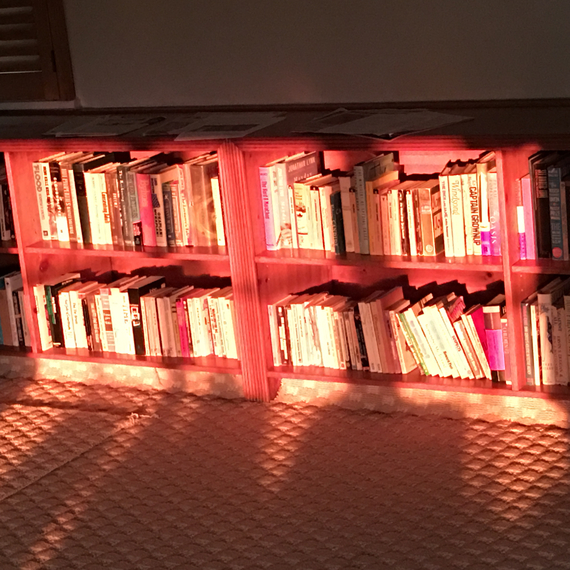
The sun rose blood red this morning. Sunlight stained the pine of my bedroom bookshelves a shade of Indian paintbrush. For minutes I just stood there, ambushed by the angled light in the silent room. As the sun crept across the carpet, I knew I was watching - even thought I could feel - the earth turn. The whole world was shot with wonder.
But then I turned on cable news and checked out links on Twitter and Facebook.
I know that's nuts. Why kill the moment? Why can't I keep my hands off the clicker and my iPhone?
I can make two arguments that surrendering my attention to cable news and social media is virtuous: 1. It's my responsibility as a citizen to be informed. 2. If I'm informed, I can make a difference. There's also a third argument that doesn't invoke virtue but makes me feel less guilty: I can't help it.
The first two rationales are axiomatic among educated people. But would I really have been a less responsible citizen if, instead of watching every minute of convention coverage, I'd gone fishing? What of lasting importance would I have missed if I'd gone on a news fast? What patriotic duty would I have to do less because I missed a few weeks of news cycles and a few billion gallons of the Twitter fire hose?
At a farewell-Cleveland event the morning after his acceptance speech, Donald Trump reminded the nation that the National Enquirer - a publication he said deserved a Pulitzer Prize - had linked Ted Cruz's father to Lee Harvey Oswald. He also invited his social media director, who had recently distributed an image connecting Hillary Clinton and piles of cash to the Star of David, to take a bow. For more than 40 minutes Trump presented the clinical symptoms of megalomania that his handlers had managed to contain during the four days of the convention.
I was riveted by the nakedness of Trump's narcissism and vengeance. But what, truly, did I learn from it? The only news was no news: The con hadn't changed. He saw no need to continue to fake a pivot to Temperament 2.0 in order to gull more marks. I'll never get those hours of watching the Republican convention back. I could have been hiking the high desert, plein-air painting, listening to Lang Lang, grilling a perfect yellow peach. Consuming convention coverage didn't make me civically smarter; it just added fresh meat to the chronicle of American descent, and depressed the hell out of me.
I'd like to think that paying close attention to this week's Democratic convention can make me a better advocate for beating Trump. But I doubt Clinton will win any more votes because the time that I spend watching four days of speeches, reporting and panic about Debbie Wasserman Schultz will better equip me to persuade someone that Clinton's plans to grow the economy or fight terrorism are better than Trump's. He has no plans. What he has is messianism, dog whistles and "Believe me." It's hard to imagine that Philadelphia coverage will give me new ammo to convince a Trump supporter to switch sides or an undecided voter to tilt Clinton's way. If knowledge could do that, a Clinton landslide would be coming into view. But the most that more information can accomplish has already been done; it has made the race a dead heat.
My excuse for being hooked on campaign news is that humans are hard-wired to be hooked by narrative. We're ravenous to know what happens next. Sheherazade stayed the blade of the sultan's executioner for 1001 nights by delaying the endings of her tales. All news is "BREAKING NEWS" for the same reason storytellers used suspense, surprise and conflict around prehistoric campfires: to hold their audience's attention.
Trump won the nomination by gaming the attention economy. He won free coverage and the networks won big ratings because he was outrageously entertaining, and there was no profit incentive to hold him accountable for blatant lying and thuggish incivility. Will the news business avoid making the same mistake in the general election? Can it do more for its audience than - in Neil Postman's phrase - amuse us to death?
During the conventions, a heat dome has been searing the nation. That juxtaposition offers an opportunity. This year is on track to be the world's hottest on record, exceeding the previous hottest year, 2015, which exceeded the previous hottest year, 2014. For the news media, this campaign offers a teachable moment. If you want to tell the most important story in human history, if you believe that rousing your audience to civic action is part of journalism's job, you might want to cover the 2016 campaign against the backdrop of brutal climate change, and to frame this election as a choice whose consequences could be irreversibly damaging for the rest of human history.
The sun that lit my bedroom bookcase is the drought sun that fueled the wildfire that flung the ash that turned the rising sun blood red. The sun that demanded mindfulness this morning is the sun now scorching the planet.
News, too, is a bid for attention. Sometimes its flash is a trick to get eyeballs. But its luminousness also holds the power to enlighten, to mobilize, to rescue. If news tried more to do that, I bet we'd notice. We might even feel the earth turn.
This is a crosspost of my column in the Jewish Journal, where you can reach me if you'd like at martyk@jewishjournal.com.

